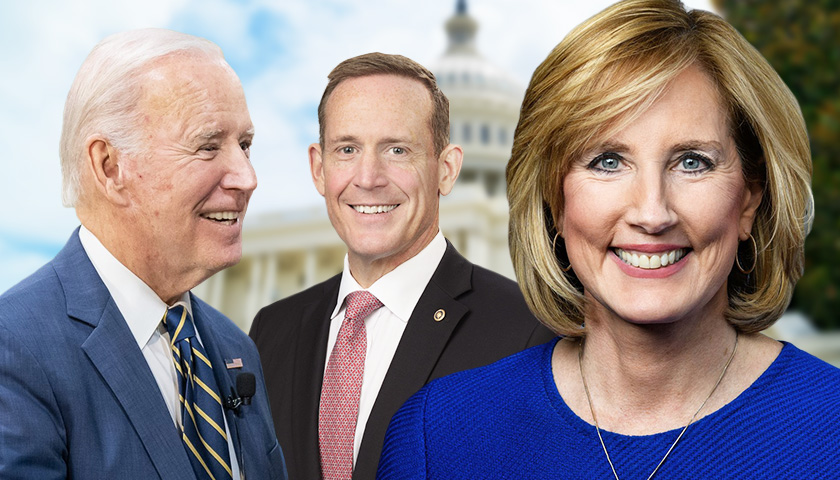by Fred Lucas
Republicans in Congress are moving to rein in President Joe Biden’s executive order putting federal agencies in the business of getting out the vote. Their proposed legislation would defund any federally backed voter mobilization drives and prohibit the government from entering election-related agreements with private, nonprofit organizations to mobilize voters.
Rep. Claudia Tenney, R-N.Y., who co-chairs the House Election Integrity Caucus, plans to introduce a bill Tuesday called the Promoting Free and Fair Elections Act.
Sen. Ted Budd, R-N.C., intends to introduce the Senate version of Tenney’s bill. Budd, who was a House member last year, was active in its Election Integrity Caucus.
The legislation would prohibit federal agencies from entering agreements with nongovernmental organizations to conduct voter registration or voter mobilization activities. It also would prohibit use of federal funds to carry out such activities.
These prohibitions would stop certain actions Biden envisioned in March 2021 in Executive Order 14019, titled “Promoting Access to Voting.” Biden’s order states that agencies will “promote voter registration and voter participation” and will be “soliciting and facilitating approved, nonpartisan third-party organizations and state officials to provide voter registration services on agency premises.”
“President Biden’s EO 14019 allows the federal government to use its power and your taxpayer dollars to influence our elections,” Tenney told The Daily Signal in a written statement, adding:
The Promoting Free and Fair Elections Act ensures that federal agencies are not engaging in partisan voter registration and mobilization efforts on the taxpayer’s dime. As the Election Integrity Caucus co-chair, it is my privilege to introduce this legislation to restore transparency and confidence in our democratic process while keeping federal bureaucrats and the swamp from deliberately tipping the balance of our elections.
Critics of Biden’s executive order previously expressed concern that it could prompt violations of the Hatch Act, which forbids political activity by federal employees on federal property or work time; violations of the Antideficiency Act, which prohibits federal employees from obligating tax dollars not authorized by Congress as well as any agency from accepting voluntary service from individuals; and violations of the National Voter Registration Act, a 1993 law better known as the “motor voter” law.
This last law authorizes federal agencies to engage in specified activities to ease voter registration, but Biden’s order goes beyond the boundaries of the law, some contend.
The aim of the Republicans’ legislation is to stop the Biden administration from using the power of federal agencies and offices, located in states across the country, from engaging in voter registration and mobilization efforts designed to benefit Democrats.
Under Biden’s order, agencies were supposed to issue strategic plans for implementing it. However, agencies have not been transparent with Congress, the media, or government watchdogs about what nonprofit groups they’re working with, nor the contents of the strategic plans.
If passed, the Tenney-Budd bill would stop any federal agency from implementing such a strategic plan until 180 days after submitting a copy of the plan to Congress.
It also would specifically prohibit agencies from engaging in any voter registration activities outlined in Section 7 of the National Voter Registration Act until at least 180 days after providing Congress a copy of a strategic plan to do so.
The Tenney-Budd legislation would prohibit agencies from conducting, or outsourcing to nonprofits, the distribution of voter registration application forms; providing assistance to applicants in completing an application; transmitting completed applications to state election officials; and doing voter registration and mobilization in federal work-study programs.
The legislation includes a requirement that all federal agencies submit to Congress, within 30 days of tts effective date, a report describing all activitiesthey carried out under Executive Order 14019.
The Promoting Free and Fair Elections Act also would provide Americans with transparency and reassurance that governing agencies are using taxpayer dollars lawfully and in their best interests, according to the bill’s summary.
Although agencies aren’t releasing their specific strategic plans for getting out the vote, since Biden issued the order in March 2021, several agencies have responded by broadly outlining actions they will take. These include:
- The Justice Department announced guidance for states to increase awareness of voting rights for convicted criminals, in compliance with Biden’s order. States differ on restoring voting rights to convicted felons after they serve their sentences.
- Based on a Freedom of Information Act request, The Daily Signal first reported that the Department of Housing and Urban Development is engaging in voter registration efforts that in some cases allow mass collection of registration forms by local public housing officials.
- The Department of Homeland Security said it will focus on voter registration “at the end of naturalization ceremonies for the hundreds of thousands of citizens naturalized each year.”
- The Education Department said it will focus on “increasing civic engagement at the elementary school, secondary school, and higher education level, helping more than 67 million students.”
– – –
Fred Lucas is chief news correspondent and manager of the Investigative Reporting Project for The Daily Signal. Lucas is also the author of “The Myth of Voter Suppression: The Left’s Assault on Clean Elections.”
Photo “Claudia Tenney” by Leah Herman. Photo “Joe Biden” by President Joe Biden. Photo “Ted Budd” by Senator Ted Budd. Photo “U.S. Capitol” by Samuel Schroth.








